

40 Times People Were Confused By The English Language. 8 Words So Poetic and Succinct That They Take Whole Paragraphs to Translate – Dusty Old Thing. In English, we often use a lot of words to make our point, giving us the freedom to customize concepts in nearly infinite ways.

But, we’ve recently come across some non-English words which seem to fit a whole paragraph into just one term. Have a look at 8 of the most succinct (and poetic) words from other languages. 8) Saudade The Portuguese word saudade recounts the longing and nostalgia that arose when thinking of a past time or a person long gone.
But, this word goes one step further because the term implies that the person or time is likely never to return to you again. This guy graphed the etymology of words and it's blowing people's minds. Cide Words (killing) BORED?
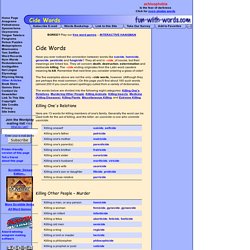
Play our free word games – INTERACTIVE HANGMAN Have you ever noticed the connection between words like suicide, homicide, genocide, pesticide and fungicide? They all end in –cide, of course, but their meanings are linked too. They all concern death, destruction, extermination and deliberate killing. The –cide ending originates from the Latin word caedere meaning to kill. The five examples above are not the only –cide words, however. The words below are divided into the following eight categories: Killing One's Relatives, Murdering Other People, Killing Animals, Killing Insects, Medicine (Killing Diseases), Killing Plants, Miscellaneous Killing, and Extreme Killing. List of animal names. Wikipedia list article For many animals, particularly domesticated ones, there are specific names for males, females, young, and groups.
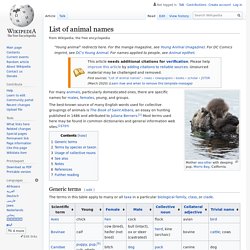
The best-known source of many English words used for collective groupings of animals is The Book of Saint Albans, an essay on hunting published in 1486 and attributed to Juliana Berners.[1] Most terms used here may be found in common dictionaries and general information web sites.[2][3][4] Generic terms[edit] Terms by species or taxon[edit] Animal Adjectives. Animal Adjectives While there are other forms of adjectives for animals, by far the greater majority of such words end in -ine; thus the following list deals excusively with this type.
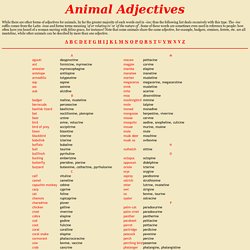
The -ine suffix comes from the Latin -inus and forms terms meaning 'of or relating to' or 'of the nature of'. Some of these words are sometimes even used in reference to people: how often have you heard of a woman moving with feline grace, for instance? Note that some animals share the same adjective, for example, badgers, ermines, ferrets, etc. are all musteline, while other animals can be descibed by more than one adjective. Home ~ The Stories ~ Diversions ~ Links ~ Contact. 11 Little-Known Words for Specific Family Members. The words we use for family members in English are specific about some things, and vague about others.

Our vocabulary marks a distinction between our mother and her sisters (some languages use one word for mother and maternal aunts), but doesn't say whether siblings are older or younger (some languages have different words for brother and sister depending on their age relative to you). We lack words that pick out particular family members (we have "cousin," but what about child-of-my-father's-brother?) As well as certain general terms (we have "siblings" for brothers-and-sisters, but what about nieces-and-nephews?) If you look hard enough, you can find some words to help fill in the gaps. Here are 11 unusual English kinship words for family members. 1. Child of your paternal uncle. 2. So2000 lederer. 19 amazing English words we've totally forgotten about. 1.

Twirlblast A tornado, according to people in the 1700s. Why we switched to tornado, I’ll never understand. 2. Origins Of Popular Jewish Surnames. Correction, Jan. 29, 2014: Some of the sources used in the reporting of this piece were unreliable and resulted in a number of untruths and inaccuracies.
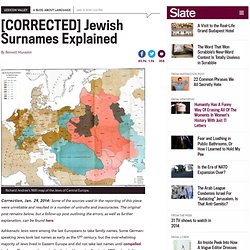
The original post remains below, but a follow-up post outlining the errors, as well as further explanation, can be found here. Ashkenazic Jews were among the last Europeans to take family names. Some German-speaking Jews took last names as early as the 17th century, but the overwhelming majority of Jews lived in Eastern Europe and did not take last names until compelled to do so. The process began in the Austro-Hungarian Empire in 1787 and ended in Czarist Russia in 1844. In attempting to build modern nation-states, the authorities insisted that Jews take last names so that they could be taxed, drafted, and educated (in that order of importance). Until this period, Jewish names generally changed with every generation. Jews distrusted the authorities and resisted the new requirement. Glossary of traditional and archaic words, by Kim Farnell. The Dictionary of Obscure Sorrows.
7 Beautiful Words With No Direct English Translation. You know that feeling you get when surrounded by close friends or family -- perhaps gathered around a fireplace after a meal, or chatting on the couch in your pajamas on a Sunday morning?

There truly is no word to describe it. Or at least not in English. The Phrontistery: Obscure Words and Vocabulary Resources. Historical Thesaurus. 12 Letters That Didn't Make the Alphabet. You know the alphabet. It’s one of the first things you’re taught in school. But did you know that they’re not teaching you all of the alphabet? There are quite a few letters we tossed aside as our language grew, and you probably never even knew they existed. 1.
Free English to Greek Dictionary - Greek Dictionary. The Color Thesaurus. I love to collect words.

Making word lists can help to find the voice of my story, dig into the emotion of a scene, or create variety. One of my on-going word collections is of colors. I love to stop in the paint section of a hardware store and find new names for red or white or yellow. Having a variety of color names at my fingertips helps me to create specificity in my writing. I can paint a more evocative image in my reader’s mind if I describe a character’s hair as the color of rust or carrot-squash, rather than red. So for fun, I created this color thesaurus for your reference. Color Words. Colour Terms This list contains 168 definitions of obscure colour terms using combinations of 'normal' colours of the rainbow and descriptive adjectives; e.g. cardinal = deep scarlet red; russet = reddish brown.
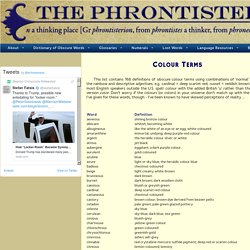
Note that most English speakers outside the U.S. spell colour with the added British 'u' rather than the American version color. Writer Creates “Color Thesaurus” To Help You Correctly Name Any Color Imaginable. Ingrid Sundberg, a writer and children’s book illustrator, created a very useful infographic chart for anyone struggling with color names. The writer says that she loves to collect words that can help give her stories variety and depth. Show Full Text. List of unusual words beginning with L.